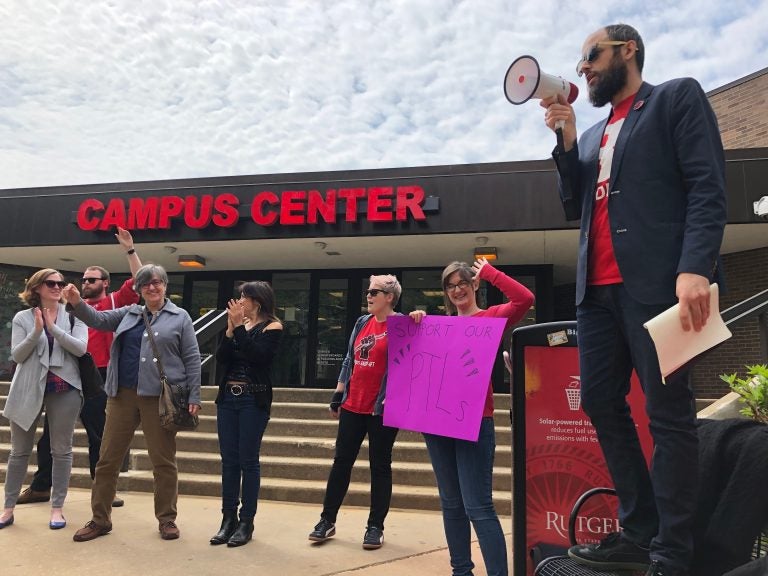Part-time lecturers ratify new contract with Rutgers
The union leader said the next step is a fight for healthcare benefits for Rutger's part-time lecturers.

A union leader said the next step is a fight for healthcare benefits for Rutger's part-time lecturers. (Joe Hernandez/WHYY)
This article originally appeared on NJ Spotlight.
—
After prolonged and tense negotiations — and division within their union — part-time lecturers at Rutgers University voted to ratify a new contract agreement.
“It was a union priority, and a priority of our membership, to create a clear and direct career path, to end the cycle at Rutgers of hiring an army of adjuncts as interchangeable, temporary freelance employees,” Teresa Politano, president of the part-time faculty union said in an email on Friday after votes had been tallied.
The contract agreement — reached on May 14 — introduces a tiered system for part-time lecturers (PTLs), offering all part-time faculty salary increases of 12 percent compounded across the life of the four-year contract, a 3 percent retroactive raise, added job security in the form of multi-semester appointments, discrimination protection and reimbursements for supplies and other academic costs.
Though some PTLs mobilized in opposition to the agreement, noting that separating adjuncts into levels (PTL, PTL 2 and PTL 3) in practice meant only a select tier of part-timers would see any significant pay raises, they were unsuccessful in their #RUVotingNO campaign on social media.
The agreement was ratified by the full Part-Time Faculty Chapter of Rutgers American Association of University Professors-American Federation of Teachers union, with 69 percent in favor.
Years of negotiation
“Changing the status quo is not without its controversy, as we have witnessed,” Politano said. “The good news about all the controversy is that the contributions of part-time faculty are more visible than ever. More adjuncts are speaking out and demanding change. For all of us, progress doesn’t happen quickly enough, but the part-time faculty union at Rutgers is stronger than ever.”
Politano said the negotiation process was arduous and union leaders met regularly for years with the Rutgers administration to hammer out a contract. She said she and the rest of the AAUP-AFT negotiators looked at several adjunct and full-time contract models across the country and sought to emulate their successes and learn from their failures. After threatening a strike, Rutgers full-time non-tenure-track faculty won major gains of their own, and some of those same union negotiators came to the table on behalf of the PTLs, bringing with them data and lessons learned from other Big Ten peer universities, she said.
In negotiating for the part-timers, the union followed the precedent set at the University of Michigan and modeled its plan to restructure the way part-time lecturers are integrated into a university after the contract gains seen at UMich. After threatening a strike of their own, adjuncts at UMich are today paid salaries that Politano and the union say are commensurate with the amount of work they do, and with job security and health benefits. Though Rutgers PTLs did not win access to healthcare benefits and $7,250 in per-course pay as they had asked, Politano said they’ve created a solid foundation for future negotiations.
“It’s a process. UMich began by creating a path to advancement, much as we did this year, and built upon it,” she said.
The next step for the union, Politano said, is to work on securing healthcare benefits for PTLs, something they set out to do during this year’s contract negotiations but was unable to secure. Hundreds of part-time faculty members at Rutgers teach the equivalent of a full-time teaching load (that amount varies per department) yet are paid by the course. Politano said the union believes those “full-time part-timers” and in fact, all part-time faculty at Rutgers should have access to adequate healthcare benefits as their full-time colleagues have.
Encouraging all adjuncts to speak out
“Rutgers cannot claim to be a national leader in health care yet deny benefits to 3,000 of its hard-working and dedicated instructors. We hope to harness this energy as we move forward in our fight for healthcare in the upcoming weeks,” Politano said.
And those rank-and-file adjuncts who organized under the #RUVotingNO and #RUExploited social media campaigns say they are not going anywhere. Their new “Rank-and-File Caucus” will remain, said caucus founder Lauren Barbato, who noted that with only a few weeks of effort, her group was able to secure a 31-percent “no” vote. She told NJ Spotlight that “in other unions when there is debate, there tends to be an increase in voter participation,” and she is hopeful the caucus’s efforts — while not enough to send the union back to the bargaining table — motivated the long-overlooked adjunct community.
“Although we fought for a different outcome, we are greatly encouraged by how quickly & successfully we organized members in just a few short weeks. There is power & strength in the rank and file,” the caucus tweeted. “We believe that in order for democracy to function well, participation and transparency are vital. The [Rank and File Caucus] will continue to engage with adjuncts to promote union membership, mobilization, & action. We encourage all adjuncts at Rutgers to make their voices heard.”
WHYY is your source for fact-based, in-depth journalism and information. As a nonprofit organization, we rely on financial support from readers like you. Please give today.




